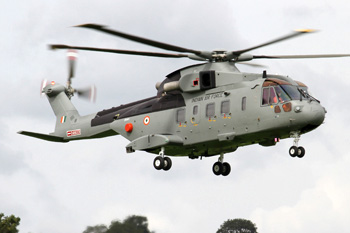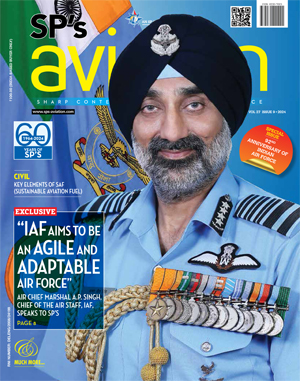INDIAN ARMED FORCES CHIEFS ON OUR RELENTLESS AND FOCUSED PUBLISHING EFFORTS

SP Guide Publications puts forth a well compiled articulation of issues, pursuits and accomplishments of the Indian Army, over the years

"Over the past 60 years, the growth of SP Guide Publications has mirrored the rising stature of Indian Navy. Its well-researched and informative magazines on Defence and Aerospace sector have served to shape an educated opinion of our military personnel, policy makers and the public alike. I wish SP's Publication team continued success, fair winds and following seas in all future endeavour!"

Since, its inception in 1964, SP Guide Publications has consistently demonstrated commitment to high-quality journalism in the aerospace and defence sectors, earning a well-deserved reputation as Asia's largest media house in this domain. I wish SP Guide Publications continued success in its pursuit of excellence.
Clean Chit for AgustaWestland
The UPA government had a strong inclination for ordering investigations into processing of tenders or contracts for defence procurement at the slightest hint of wrongdoing.
 |
By Air Marshal B.K. Pandey (Retd) Former Air Officer Commanding-in-Chief of Training Command, IAF |
As per recent reports in the media, a court in Italy that was dealing with the allegations wrongdoing by senior functionaries of Finmeccanica in the execution of the 3600 crore contract signed with the Indian Ministry of Defence (MOD) for the supply of 12, AW-101 AgustaWestland helicopters for VVIP travel, has delivered its final judgement in the case. In a document that runs into 145 pages, the Italian court has stated unequivocally that no corruption was found in Italian company AgustaWestland's chopper deal with the Indian Air Force. Specifically, the court has found no evidence of any corruption by Air Chief Marshal SP Tyagi, the former Chief of the Air Staff (CAS) of the Indian Air Force (IAF). The court has thus categorically and firmly acquitted the former CAS of any charge related to wrongdoing in the processing of the tender and award of contract for the AgustaWestland helicopters.
The Central Bureau of Investigation (CBI) in India that had been tasked by the UPA government to carry out investigations independently against a number of individuals alleged to be involved in wrongdoing including Air Chief Marshal SP Tyagi, is yet to close the case and submit its final report. It is understood that despite all effort, the CBI has not been able to find any evidence of misdemeanour on the part of the former CAS.
Procurement of VVIP Helicopters

AW101
The sordid saga of the ill-fated helicopter deal began in February 2010 when the MOD concluded a contract with AgustaWestland, a company under the Finmeccanica conglomerate, for the purchase of 12 AW-101 helicopters for the transportation of VVIPs. For this task, the IAF had been operating a fleet of Russian MI-8 helicopters that had already been overtaken by obsolescence. The IAF had informed the MOD that the fleet of MI-8 helicopters would have to be retired from service in the near future after which there would be no rotary wing aircraft available with the IAF that would meet with the standards required for VVIP travel. The case for procurement of new helicopters for VVIP use had therefore acquired a degree of urgency.
In February 2013, three years after the contract with AgustaWestland was concluded, the deal was suddenly mired in controversy when the Italian authorities alleged that bribes were paid to certain Indian officials by the company to clinch the deal for the 12 AW-101 VVIP helicopters. Unfortunately, Air Chief Marshal SP Tyagi who had been the Chief of the Air Staff when the tender was being processed, but had retired some six years before the controversy broke, was also dragged into it as one of the possible beneficiaries of the kickbacks. The total pay out to the parties in India was alleged to have been to the tune of 360 crore. On the face of it the matter appeared extremely serious as the Italian authorities had arrested Giuseppe Orsi, the Chief Executive Officer (CEO) of Finmeccanica, the parent company of AgustaWestland. The reaction of the UPA government came by way of AK Antony, the Minister of Defence freezing the contract and ordering an investigation by the CBI into the allegations the day after the arrest of the CEO of Finmeccanica. Meanwhile, the Indian government had already paid 30 per cent of the value of contract and the IAF had received three of the 12 machines ordered.
Cancellation of Contract and its Implications
| While the action by Minister of Defence was ethically correct, it left the plans of the IAF for revamping the rotary wing fleet for VVIP travel in complete disarray. |
Without waiting for the final report on the findings by the CBI or of the Italian court, in January 2014, the Indian government cancelled the 3,600 crore contract with AgustaWestland. The reason for the cancellation of contract as stated by the government was "Breach of the Pre-Contract Integrity Pact and the agreement by AgustaWestland International Ltd".
The remarkably swift action by an otherwise lethargic government to cancel the contract with AgustaWestland for the supply of 12 AW-101 VVIP helicopters merely on unsubstantiated reports of wrongdoing in the processing of contract for the military helicopters, did signal the seriousness of the intent of the government to the global aerospace and defence industry that in the procurement of military hardware, India would not accept malpractices associated with the employment of middlemen such as the payment of bribes or kickbacks to influence decision makers in order to secure lucrative high value defence contracts. However, while this action by AK Antony, the Indian Minister of Defence would appear ethically correct and noble, it left the IAF high and dry with plans for revamping the rotary wing fleet for VVIP travel gone completely awry. The IAF was literally left ‘holding the baby” with three AW-101 helicopters already delivered by the company. Procured at considerable expense, these three machines are gathering dust at IAF Station, Palam as in the absence of product support from the Original Equipment Manufacturer (OEM) AgustaWestland, these will be of little use to the IAF as these can neither be used for VVIP travel nor for routine operational deployment. Consequently, the IAF was left with no option but to divert few of the latest acquisitions of the MI-17 V5 from operational squadrons to be refitted and dedicated for VVIP travel. Undoubtedly, this would have dented the operational potential of the rotary wing fleet of the IAF apart from the MOD saddled with a legal battle in Italian courts to recover the advance paid to the Anglo-Italian company.
The cancellation of the contract for the AgustaWestland helicopters is of little military significance as these machines were meant solely for the transportation of VVIPs and were not being procured for operational tasks. However, what is and ought to be a matter of concern is the callous disregard by the government for the deleterious impact of such ill-considered decisions on the operational potential of the armed forces. The UPA government had a particularly strong inclination for ordering investigations into processing of tenders or award of contracts for procurement of military hardware, blacklisting of firms and cancellation of contracts at the slightest hint of wrongdoing. In the wake of allegations of misdemeanour, manufacturers of military hardware of global repute from Israel, Switzerland, Russia, Singapore and South Africa were blacklisted leading to supply chain problems for the Indian armed forces that continue to depend on foreign suppliers for around 70 per cent of their requirement of military hardware. The tender for artillery guns for the Indian Army was cancelled five times and that for 197 light utility helicopters was abrogated twice following allegations of wrongdoing and finally scrapped leaving the troops deployed in the high mountains of North India without the required level of logistic support.
Restructure the Defence Procurement Procedure
| Cancellation of contract on account of misdemeanour by individuals is counter-productive as it would adversely affect the modernisation programme of the armed forces. |
Part of the problem lies with the Defence Procurement Procedure (DPP) which was promulgated after the emergence of a uni-polar world following the end of the Cold War. The objective of the DPP was to provide the armed forces with a wide choice in the global market, to obtain the best value for money and to enhance the capability of the indigenous aerospace and defence industry through offsets. The DPP provided a framework that was rather rigid with no room for any of the functionaries in the armed forces or the bureaucracy in the MOD to exercise discretion. It also had in-built provision for litigation. Over the years, the DPP has been revised periodically and with every revision, it became increasingly inflexible. Today, the DPP has been reduced to being merely a clerical exercise as over last decade and a half, it has totally failed to address the imperatives of national security. This is abundantly clear from the fact that so far only one tender, that for the Pilatus PC-7 Mk II basic trainer aircraft from Pilatus of Switzerland had been successfully completed.
Fortunately, the government of the day appears to be aware of the limitations of the DPP as was evident in the briefing by Manohar Parrikar, the Minister of Defence to the media after the tender for 126 medium multi-role combat aircraft (MMRCA) had been scrapped. The MMRCA tender floated under the DPP, after eight years of effort, had come up against an insurmountable roadblock and had to be replaced by a direct deal with the government of France for purchase of 36 Rafale combat jets. Now that the government has embarked on an exercise to restructure the DPP, hopefully, the armed forces will be able to induct weapon systems to restore its operational edge over the adversaries in a respectable time frame.
A restructured DPP must necessarily incorporate a procedure to separate offence from contract and deal with the guilty without jeopardising the contract itself. Cancellation of contract on account of misdemeanour on the part of individuals is counter-productive as it would adversely affect the modernisation programme of the armed forces. Such a decision would clearly be unwise and certainly not in the best interests of national security.





